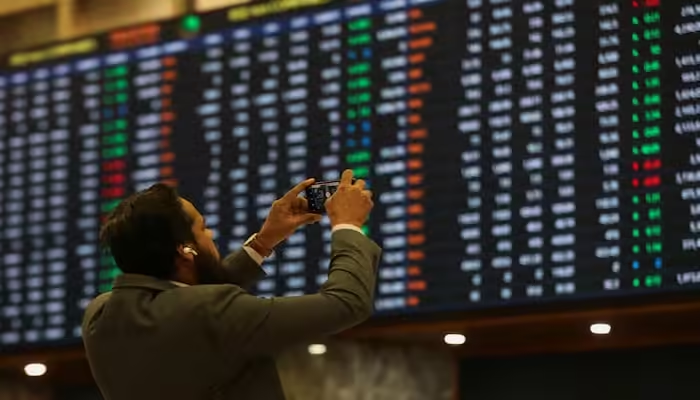In an unprecedented turn of events, the Pakistan Stock Exchange (PSX) achieved an all-time high during today’s trading session. The PSX 100 Index surpassed the 80,000-point mark for the first time, a significant milestone that underscores the growing investor confidence in the country’s economic future.
The PSX 100 Index reached an impressive 80,254 points after a substantial increase of 701 points. During the session, the index had surged by more than 800 points at one stage, demonstrating the robust market activity and positive sentiment among investors. By the close of business yesterday, the index had settled at 79,552 points, making today’s rise even more noteworthy.
This surge in the stock market is largely attributed to the optimism surrounding the upcoming budget. Economists have expressed confidence that the budget will include favorable measures that could pave the way for a long-term International Monetary Fund (IMF) loan, which is anticipated to bolster economic stability and growth. The prospect of securing an extended IMF loan has played a crucial role in boosting investor sentiment and market performance.
Economists also predict that interest rates will decrease in the coming weeks and months, correlating with a reduction in inflation rates. Lower interest rates are expected to stimulate economic activity by making borrowing more affordable for businesses and consumers. This anticipated economic stimulus has further fueled the bullish trend in the stock market, as investors look forward to improved financial conditions and growth prospects.
On the currency front, the interbank exchange rate for the US dollar experienced a slight increase today. The dollar appreciated by 2 paisa, reaching 278.40 rupees in the interbank market. Yesterday, the dollar had closed at 278.38 rupees, indicating a marginal upward movement. The exchange rate fluctuations are closely monitored by investors and policymakers, as they can impact trade balances, import costs, and overall economic stability.
The PSX’s historic rise is a reflection of the broader economic optimism prevailing in the country. Market participants are hopeful that the upcoming budget will introduce reforms and policies conducive to long-term economic growth. The expectation of reduced interest rates and lower inflation adds to the positive outlook, suggesting a more favorable environment for investment and business expansion.
However, it is important to note that while the stock market’s performance is a positive indicator, it is not the sole measure of economic health. Sustainable economic growth requires a comprehensive approach that includes structural reforms, fiscal discipline, and policies that promote equitable development.
The government’s ability to secure a long-term IMF loan will be a critical factor in sustaining investor confidence and ensuring economic stability. Such a loan would provide much-needed financial support and signal to international markets that Pakistan is committed to implementing necessary economic reforms. It would also help in addressing the country’s fiscal challenges and improving its creditworthiness.
As the stock market continues to break new records, it is essential for policymakers to capitalize on this momentum by enacting measures that support long-term economic resilience. This includes investing in infrastructure, education, and healthcare, which are fundamental to sustainable development.
Today’s record-breaking performance of the Pakistan Stock Exchange is a testament to the optimism and confidence of investors in the country’s economic future. The PSX 100 Index’s unprecedented rise past 80,000 points marks a significant achievement and sets a positive tone for the financial markets. With expectations of favorable budget measures, a potential long-term IMF loan, and decreasing interest rates, the outlook remains bright. However, sustained economic growth will depend on the government’s ability to implement comprehensive reforms and policies that promote stability and development across all sectors. As the nation moves forward, continued vigilance and strategic planning will be key to harnessing the potential of this promising economic landscape.



